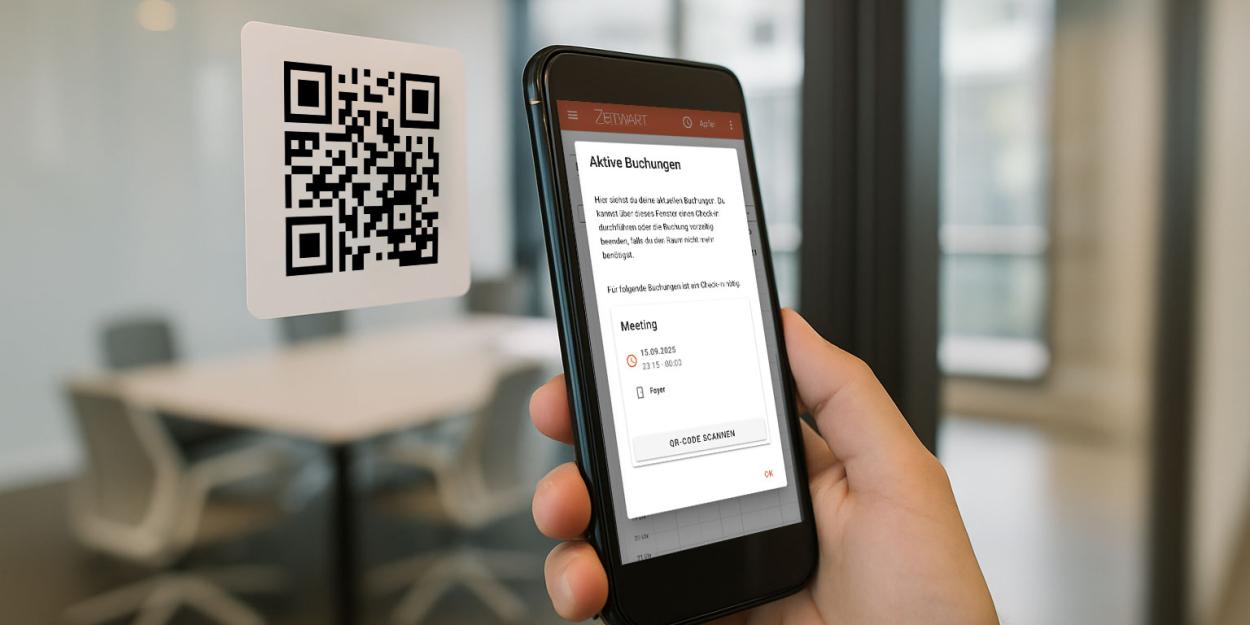
20.09.2025
Check-in with QR codes: Efficient workstation management in libraries and modern room planning without no-shows
With Zeitwart's QR code check-in, institutions reduce no-shows, increase the utilisation of their workstations and improve space planning.
The problem of empty reservations
There is a recurring pattern, especially in libraries with high demand for workstations: places are reserved in advance, but some users do not turn up. These so-called no-shows block valuable resources, distort utilisation statistics and lead to frustration among students who urgently need a workstation.
With Zeitwart's QR code check-in, libraries and other institutions now have a tool that meets these challenges. A workstation is only considered occupied when a user checks in on site using a smartphone. If the person is absent, the space is automatically released and can be used by others.
Flexible QR codes for different scenarios
The strength of the system lies in its flexibility. Libraries, universities or companies can decide for themselves whether the QR code should be valid for a single workstation, an entire reading room, several floors or even the entire building. This range makes it possible to adapt the check-in rules precisely to your own organisation.
The codes can also be time-controlled. While static codes can be permanently attached to a workstation, for example, dynamic QR codes go one step further: they change at short intervals and can also be linked to digital room displays or e-paper stations.
Dynamic codes prevent misuse
A central problem of many booking systems is the possibility of simply photographing QR codes and later misusing them for a "remote check-in". This is precisely where dynamic QR codes from Zeitwart come in. As the code renews itself automatically at short intervals, a photo or screenshot is worthless after just a few seconds.
This means that you can only check in if you are actually at your desk. Anyone who reserves a space but does not turn up automatically loses their booking after the deadline. This is a huge advantage for libraries, as it guarantees a fair and transparent distribution of workstations. At the same time, the reliability of the statistics increases because they are no longer falsified by fictitious bookings.
Check-in also possible without a smartphone
Not all visitors have a smartphone or want to use it for check-in. To ensure that this target group can also reliably reserve and use workstations, Zeitwart offers a simple alternative: check-in can be carried out by library or organisation staff at any time.
In practice, this means that users without a smartphone only need to inform the circulation desk or service desk. There, the check-in is confirmed manually by the library staff. In this way, the system remains fair for everyone, regardless of the individual's technical requirements.
This has an additional advantage for libraries: they retain full control over the allocation of workstations even in special cases, while transparency and traceability are guaranteed in the system.
Integration into existing systems
Many institutions already rely on Microsoft 365 or Outlook for room and workplace management. Zeitwart integrates seamlessly into these systems: a workstation or room booked via Outlook can be confirmed via QR code check-in. The familiar booking process remains the same for users, while the institution benefits from additional transparency and control mechanisms.
More efficiency in libraries
Libraries in particular benefit from this approach. Workstations are often scarce here and demand is high, especially during exam periods. By checking in with QR codes, libraries can ensure that reserved spaces are actually used. No-shows are automatically visible, free spaces are released for other students and the administration gets a realistic picture of the actual utilisation.
A pilot project with the new check-in system will soon be launched at the Nuremberg-Erlangen Academic Library. The aim is to make the use of workstations more transparent and significantly reduce the number of empty reservations. We will report on the results soon.
From space management to smart space planning
However, the benefits go far beyond simply avoiding no-shows. With the data collected, libraries and organisations can plan their spaces in a much more targeted manner. Popular work areas become visible, utilisation peaks can be analysed and the institution can respond better to actual demand.
As a result, space management is evolving from a pure booking logic to a data-based space strategy. Libraries, for example, can check whether additional workstations are needed or whether existing areas should be remodelled. Companies are given the opportunity to utilise office space more efficiently and reduce costs.
Can be used immediately without additional modules
The check-in feature with QR codes will soon be activated for all Zeitwart customers. No additional modules are required and it is quick to set up. Libraries, universities and companies can immediately start taking their room and workplace management to a new level.